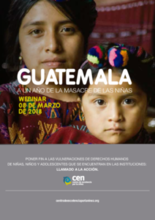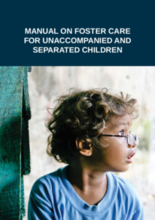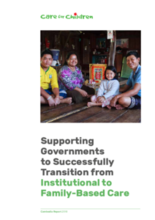Displaying 661 - 670 of 1469
Esta llamada a la acción se propone activar, o profundizar y fortalecer —según el estado de avance en cada país— apuntan a poner fin al acogimiento de niños y niñas en centros residenciales sin que éste responda a los principios de necesidad e idoneidad encuadrados en las Directrices de Naciones Unidas sobre las modalidades de cuidado alternativo de los niños.
This is the report of the 3rd Biennial International Conference (3rd BICON) on “Evolving Trends in Alternative Care for Children in South Asia” that was convened by Udayan Care on March 16 & 17, 2018 at Amity University, Noida NCR (India).
This Manual sets the minimum standards and policies for the protection and care of unaccompanied and separated children (UASC) within a foster care arrangement in Malaysia.
Based on an analysis of the evolutions in the way the care structures for unaccompanied minors were set up in Belgium, the authors of this article critically reflect on the underlying rationales that justify the particularities of these structures, hereby also reflecting about the implications of these rationales for professionals and researchers.
Drawing on in-depth semi-structured interviews with 37 caregivers in two Children's Homes in Ghana, this study sought to explore caregivers' suggestions of solutions to barriers in childcare.
This study investigated the relationship between congenital conditions and post-adoption mental disorder diagnosis and treatment in 235 female youth who were adopted from China about 15 years prior.
This study aims to observe the effect of structured education provided to improve self-esteem and hope on the self-esteem and the suicide probability of male adolescents living in orphanages.
This article discusses emerging trends in deinstitutionalisation and alternative care avenues nationally and internationally and examines the Miracle Foundation's evolution from a residential care provider to a family-based care and family strengthening organization.
This report from UNICEF assesses the world’s performance towards meeting the 2030 Sustainable Development Goals (SDGs) to date, focusing on 44 indicators that directly concern 2030’s most important constituency: children.
This report provides a summary of research methodology and details of meetings and data collection from an October 2017 research visit to understand the current child welfare system in Cambodia, in particular the role and function of the Government residential care institutions (RCIs). The report presents findings and recommendations for pathways forward for government-led foster care development.




